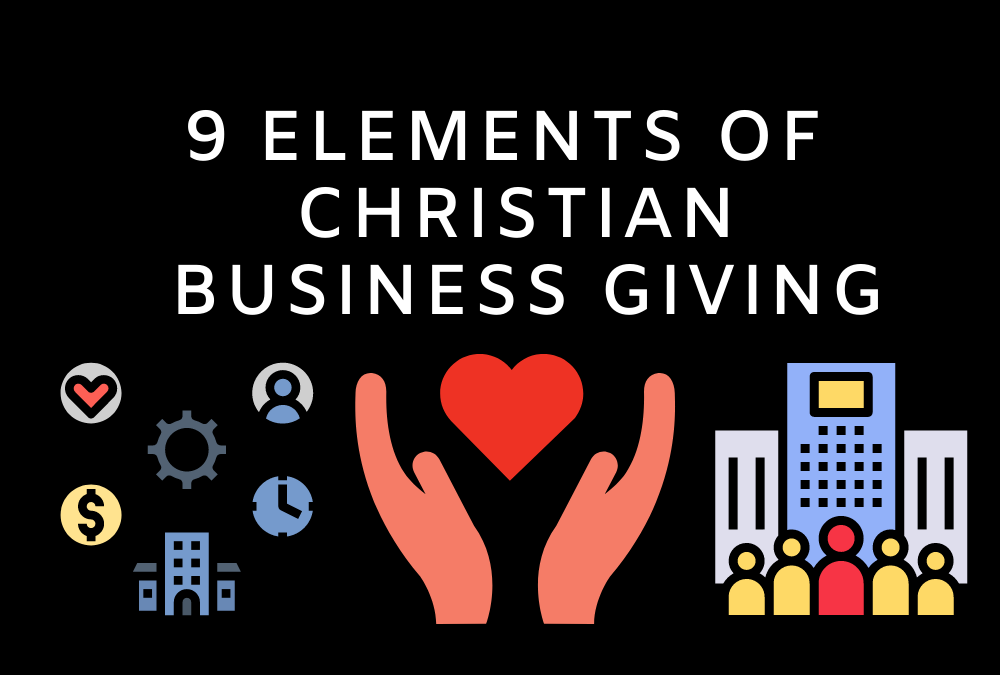Giving Is One of the Hallmarks of Christian Living
No one argues with the idea that giving, and giving generously, is expected of every Christian.
But what about Christian business giving?
Is there an expectation that Christian-owned businesses – as entities that exist separate and apart from their owners – should also give?
In The Good Book on Business, I point out that Biblical businesses – ‘households’ in the Bible – are entities that have a powerful standing in the Kingdom, and are God’s first choice for a venue in which to interact with mankind.
Understanding that Biblical businesses have a special role in the Kingdom, it seems to me that the question should not be: “Do Christian businesses have a responsibility to give?” Instead, the question should be, “How can Christian businesses use their unique set of attributes and special standing in the Kingdom to do more good by giving?”
How can Christian businesses use their unique set of attributes and special standing in the Kingdom to do more good by giving?
Individual Christians are limited in their giving. Generally, their income is limited to that which comes from one person, for example, or the other members of the family. The limited numbers of people also confine the time and emotional energy available to give to others.
However, businesses, because they are accumulations of individuals – owners, employees, vendors, customers, and all their families – all united in a common cause, and a common set of relationships, organized to accomplish — have a far greater capacity to give time, money and emotional energy than individuals.
Whereas an individual may have a certain income, the company typically has a multiple of that income. Whereas an individual may have a spiritual gift, the folks who make up the company have a multitude of spiritual gifts among them. Whereas an individual only has a certain amount of time and emotional energy to give, the company has many more times that amount of time and energy.
In short, you can do a whole lot more with the assets and capability of a company than you can as an individual. For example, one person may be able to donate a half-day on a weekend to work at a food bank. The company, on the other hand, working as a single entity, could create the food bank. One person may be able to donate to the cost of a surgical procedure for a child in a developing country. The company, on the other hand, could send the doctor to do multiple such surgeries.
Understanding that a more precise question then emerges:
How can we use our special attributes of consolidated time, money, spiritual gifts, and emotional energy to give in ways that allow us to have a special and greater impact?
I suspect that very few business owners and executives have ever asked that question. There are lots of reasons for that. But, more important than analyzing the past is planning for the future. The important thing is that you are here, now, and you have the question before you.
Before you jump to solutions, let me suggest that you first give thought to a process for identifying answers to the question. So, instead of you, personally, coming up with the ideas for answers, suppose you could harness the assembled power of the people in your business to develop possible answers.
How would you go about that? What would that process look like?
I suspect it would have these 9 Elements:
1. Prayer
What a meaty issue to take to God. “Lord, guide us in developing a focus for our giving of time, money, and emotional energy. Show us where we can have the greatest impact with what we have.” The Christians among the group should make it matter for prayer before you begin and during the whole process.
2. Education
You’d need to decide what the folks needed to know before they were equipped to brainstorm solutions. Very few people have an informed idea of ‘spiritual gifts’ for example. Then, you’d have to devise a way to help them learn.
3. Executive Transparency
The company’s employees, vendors, customers, and other stakeholders would need to see the owners and executives as being genuine, sincere in their Christianity, and committed to the process.
4. Assessment
If, for example, you’d want to use the company’s assembled skills and life experiences, you’d have to assess what those skills and experiences were. From my experience, the focus of a project or a business often proceeds out of the skills and experiences of the key stakeholders. So, maybe a good assessment of those combined skills will naturally lead to a project(s) for the company.
5. Brainstorming
The entire group of stakeholders ought to be given the charge to offer some ideas for projects. Small group brainstorming sessions could be held to generate and refine those ideas.
6. Consolidation, prioritization, and commitment
Some of the ideas will naturally rise to the surface. At some point, someone will need to narrow the list down, prioritize them, and commit the group to one or more that seem most likely.
7. Execution
Once you decide on what to do, you’ve got to do it.
8. Reporting and communication
All the stakeholders should regularly be informed of the progress and the next steps for the project.
9. Assessment
At some point, it would be helpful to stop and ask, “What have we accomplished?” “How many people have we impacted in positive ways?” While it’s natural to look outward, at the focus of the project, it has been my experience that these kinds of giving experiences are more likely to produce more blessings for the giver than the receiver. Don’t neglect to look inward at the impact on your organization and your people.
While very few business owners and executives have ever considered the question of corporate giving, our evolving understanding of the powerful role of Christian businesses in the Kingdom naturally leads us to the question.
You may want to review a recent podcast, on the subject, or read The Good Book on Business to gain an understanding of the significant role designed for businesses in the Kingdom.



Trackbacks/Pingbacks